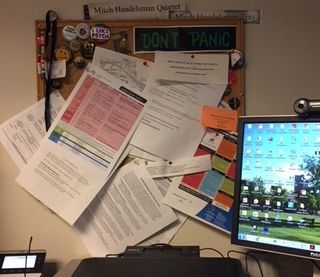Motivation
Two Quick Principles for Dealing With Students
How to infuse some virtue into the dark days.
Posted October 30, 2017
At my university, we are just past the halfway point in the semester—the point where I can’t remember the beginning of the semester and I can’t imagine the end. My students are frazzled from writing a steady stream of POT papers and other assignments, and I’m frazzled with grading them. Now is the time to bolster my motivation by reminding myself of some important virtues (see, for example, a recent article by Hawking, Curlin, & Yoon, 2017).
As I interact with students at this tiring juncture, I need a shot of compassion, diligence, and respectfulness more than a shot of adrenaline. Here are two ways I get that shot:
The Principle of Inadvertent Inspirational Interactions (The Story of the Best Mid-Term Evaluation Response Ever)
Last week I administered mid-term course evaluations to my students. When I talked with them about the results (which were pretty good; just some minor tweaks!), I tell them this story:
Many years ago, in a large section of Intro Psych, a student wrote this on his or her mid-term evaluation: “I don’t understand how you can be so enthusiastic in class every day.” I loved that response, of course, but I did more than celebrate. I read the comment to the class the next day and responded to it by saying something like this:
When I went to college and graduate school, I experienced interactions with professors that changed my life. Some of these interactions were in the classroom; some were out of class. Additionally, neither my professors nor I could predict when those interactions would happen. One or both of us didn’t recognize the importance of the interaction at the time.
One of you could have an interaction with me that will change your life—for the better, I hope! But here’s the problem: I don’t know who the student will be, or when the interaction will occur. Thus, I have to treat every interaction with students with the idea that this could be one of those moments.
I “vaccinate” myself with this idea at the beginning of each semester, and whenever I need a booster. Sharing the story with my current students reminds me of the principle—and puts us all on notice that college is not just an empty exercise.
The Principle of Reflective Responses (The Story of the Modified Garage Sale Sign)
One Saturday afternoon, many years ago, I saw a poster at a garage sale that said something like, “Someday I hope to be the person my dog thinks I am!” I immediately knew what I had to do. But instead of getting a dog, or even buying the poster, I went to my office Monday morning and made my own sign: “WHAT WOULD I DO IF I WERE THE TYPE OF PROFESSOR THAT I WOULD WANT MY STUDENTS TO THINK I AM?”

It’s been on my office bulletin board ever since, right below my “Don’t Panic” sign (which also helps!). I display the sign in public view as a reminder, and to hold myself accountable.
Do these principles and their applications work in practice? Does it really help to advertise them to my students? I don’t know. You’ll have to ask my students. But I believe this: One of the reasons I love going to work is to try again to actualize them a little better today than I did yesterday.
© 2017 by Mitchell M. Handelsman. All Rights Reserved
References
Hawking, M., Curlin, F. A., & Yoon, J. D. (2017). Courage and Compassion: Virtues in Caring for So-Called “Difficult” Patients. AMA Journal of Ethics, 19, pp. 357-363.


